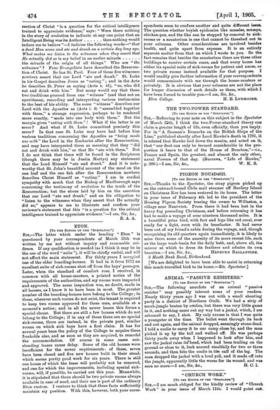[TO THE EDITOR OF THE "SPECTATOR." J
SIR,—The letter which under the heading " Eton " is questioned by your correspondents of March 25th was written by me not without inquiry and reasonable evi- dence. If any qualification is needed (as I think it may be in the use of the word "suite "), it will be chiefly verbal, and will not affect the main statement. For thirty years I occupied one of the older boarding-houses. It had in it from 1872 an excellent suite of sick-rooms shut off from the boys' passages. Later, when the standard of comfort rose, I received, in common with all house-masters, a printed notice of the requirements of the authorities, and my rooms were inspected and approved. The same inspection was, no doubt, made in all houses, as I know it to have been in most. The greater number of the boarding-houses here belong to the College ; in these, wherever such rooms do not exist, the tenant is required to keep two rooms approved for these uses, available at a moment's notice ; and in all the newer leases this forms a special clause. But there are still a few houses which do not belong to the College; if in any of these there are no special sick-rooms, there are instead, in the private part, similar rooms on which sick boys have a first claim. It has for several years been the policy of the College to acquire these freeholds also, and as soon as they are acquired, to remodel the accommodation. Of course in some cases out- standing leases cause delay. Some of the old houses were insufficient for the newer requirements: of these, seven have been closed and five new houses built in their stead, which seems pretty good work for six years. There is still one house of which the lease will probably not be renewed, and one for which the improvements, including special sick- rooms, will, if possible, be carried out this year. Meanwhile, it is stipulated that there should be two private rooms always available in case of need, and their use is part of the ordinary Eton custom. I venture to think that these facts sufficiently maintain my position. With this, however, both your corre- spondents seem to confuse another and quite different issue. The question whether boyish epidemics like measles, mumps, chicken-pox, and the like can be stopped by removal to sick- rooms or a sanatorium is one that cannot be threshed out in your columns. Other considerations are involved besides health, and quite apart from expense. It is an entirely separate matter from that on which I wrote to you. So the fact remains that besides the sanatorium there are three other buildings to receive certain cases, and that every house has either its special suite of sick-rooms for patient and nurse, or two private rooms instead available for that purpose. I would readily give further information if your correspondents would communicate with me through the house-masters or privately. It is obvious that your columns are not the place for longer discussion of such details as these, with which I have been forced to trouble you.—I am, Sir, &e., Eton College. H. E. LUXMOORE.






































 Previous page
Previous page